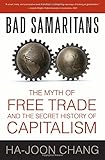I think this book explains that: https://www.amazon.com/Bad-Samaritans-Secret-History-Capital...
* Twenty-Three Things They Don't Tell You about Capitalism [1]
* Bad Samaritans: The Myth of Free Trade and the Secret History of Capitalism [2]
[1] https://www.amazon.com/Things-They-Dont-About-Capitalism/dp/...
[2] https://www.amazon.com/Bad-Samaritans-Secret-History-Capital...
1. https://www.amazon.com/Bad-Samaritans-Secret-History-Capital...
The impetus later came from the central government, and in 1905 Japan was not a negligible country anymore. The moral of the story is that free-market bullshit and Ayn Rand books are just make-believe stories without any solid backing.


https://en.m.wikipedia.org/wiki/Economy_of_South_Korea
“Following the Korean War, South Korea remained one of the poorest countries in the world for over a decade. In 1960 its gross domestic product per capita was $79,[57] lower than that of some sub-Saharan countries.[58] The growth of the industrial sector was the principal stimulus to economic development. In 1986, manufacturing industries accounted for approximately 30 percent of the gross domestic product (GDP) and 25 percent of the work force. Benefiting from strong domestic encouragement and foreign aid, Seoul's industrialists introduced modern technologies into outmoded or newly built facilities at a rapid pace, increased the production of commodities—especially those for sale in foreign markets—and plowed the proceeds back into further industrial expansion. As a result, industry altered the country's landscape, drawing millions of laborers to urban manufacturing centers.”
A good book that talks about this economic transformation and how it was achieved is bad Samaritan’s:
https://www.amazon.com/Bad-Samaritans-Secret-History-Capital...
The books author is a Korean economist who grew up during this period. One point that he makes which is very interesting is that South Korea had very strict laws preventing its academics from migrating to other countries. Those that did travel abroad to study were forced to return and participate in the economic development of the country. He attributes this as part of the reason for South Korea’s turn around.
China is another economic success story that restricts its citizens movements. Not saying that I agree with either of these policies. Just bringing them up as eastern counterpoints to the notion that unlimited free trade and free movement are the optimal states for economic development.